
Ole Anton Qvam was a Norwegian lawyer and Liberal politician, who was the Norwegian minister of Justice 1891–1893, 1898–1899 and 1900–1902, minister of the Interior 1899–1900, as well as head of the ministry of Auditing, ministry of Agriculture and ministry of Justice in 1900, and Norwegian prime minister in Stockholm 1902–1903.

Katti Anker Møller was a Norwegian feminist, children's rights advocate, and a pioneer of reproductive rights.

Marit Nybakk is a Norwegian politician for the Labour Party, a former First Vice-president of the Norwegian Parliament, the Storting, and a former President of the Nordic Council. From 2016 to 2018 she was President of the Norwegian Association for Women's Rights, the preeminent women's and girls' rights organisation in Norway.

Betzy Aleksandra Kjelsberg was a Norwegian women's rights activist, suffragist and a member of the feminist movement. She was a politician with the Liberal Party and the first female board member of the party.

The Norwegian Association for Women's Rights is Norway's oldest and preeminent women's and girls' rights organization and works "to promote gender equality and all women's and girls' human rights through political and legal reform within the framework of liberal democracy." Founded in 1884, NKF is Norway's oldest political organization after the Liberal Party. NKF stands for an inclusive, intersectional and progressive mainstream liberal feminism and has always been open to everyone regardless of gender. Headquartered at Majorstuen, Oslo, NKF consists of a national-level association as well as regional chapters based in the larger cities, and is led by a national executive board. NKF has had a central role in the adoption of all major gender equality legislation and reforms since 1884.
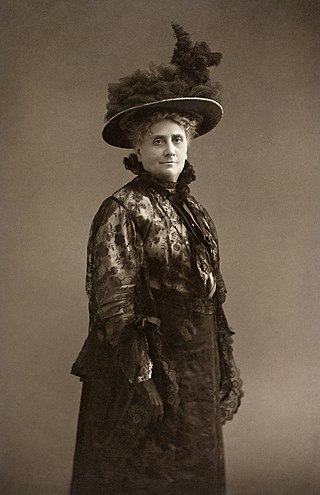
Jørgine Anna Sverdrup"Gina" Krog was a Norwegian suffragist, teacher, liberal politician, writer and editor, and a major figure in liberal feminism in Scandinavia.
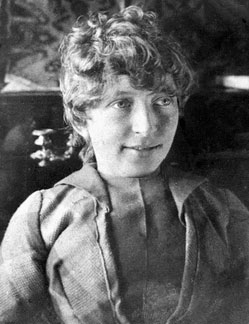
Ida Cecilie Thoresen Krog was a Norwegian women's rights pioneer and Liberal Party politician, and the first female university student in Norway. She became famous when she was allowed to submit to examen artium in 1882, after an Act amendment had taken place. She was the first president of the women's rights association Skuld and a co-founder and vice president of its successor, the Norwegian Association for Women's Rights. She was also a co-founder and board member of the Norwegian Women's Public Health Association. She was active in the Liberal Party and her liberal views also colored her involvement in the women's rights movement. She was elected a deputy representative in Christiania City Council for the Liberal Party in 1901, as one of the first women elected to a political office in Norway.
The Forum for Women and Development, often known as FOKUS Kvinner, is a Norwegian non-governmental organization aimed at spreading information on women-centered development cooperation and to be a cooperation forum for the Norwegian women's organizations in regard to their development activities in the Global South.

Karen Grude Koht was a Norwegian educationalist, essayist and feminist pioneer.

Randi Marie Blehr was a Norwegian feminist, liberal politician, suffragist, peace activist and women's rights activist. She was married to Prime Minister of Norway Otto Blehr, and was therefore addressed as "Madam Prime Minister" during her lifetime. She was one of the preeminent leaders of the Norwegian women's rights movement from the 1880s and co-founded the Norwegian Association for Women's Rights, serving as its President from 1895 to 1899 and from 1903 to 1922. She also initiated the establishment of the Norwegian Women's Public Health Association that grew to become a humanitarian organisation with 250,000 members. She was a leading advocate of Norwegian independence from Sweden and took on representative duties for Norway during her husband's tenure as Prime Minister.

A communion cup is a ritual liturgical vessel, a variant of a chalice, used by only one member of the congregation. A communion cup is usually quite small; it can be as small as a shot glass. They may be designed as small beakers or as miniature versions of the usual liturgical chalice.
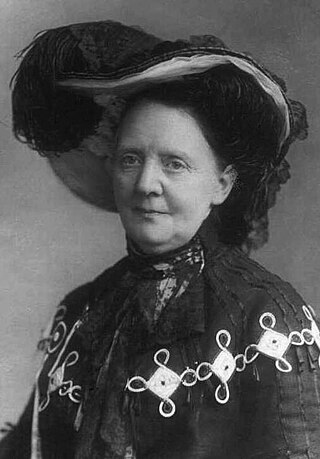
Fredrikke Marie Qvam was a Norwegian humanitarian leader, feminist, liberal politician and the wife of Prime Minister Ole Anton Qvam. She was the founder (1896) of the Norwegian Women's Public Health Association that grew to become Norway's largest women's organisation with 250,000 members, and served as its first President from 1896 to 1933, and as its Honorary President from 1933 until her death. She also served as president of the Norwegian Association for Women's Rights from 1899 to 1903. She was widely regarded as one of the most influential and successful political lobbyists of her time, and was described in the journal Samtiden in 1915 as the "Queen of the corridors." She was addressed as "Madam Cabinet Minister" and later as "Madam Prime Minister", using her husband's titles.

Fredrikke Andrea Møllerup Mørck was a Norwegian liberal feminist, editor, and teacher. She served as the editor-in-chief of the women's rights magazine Nylænde from 1916 to 1927 and as the 10th president of the Norwegian Association for Women's Rights from 1926 to 1930.
The Norwegian Women's Lobby is a feminist policy and advocacy organization in Norway and works for "the human rights of girls and women in all their diversity, to eliminate all forms of discrimination against all girls and women and to promote a gender equal society." It is described as the country's "main, national, umbrella organization" for women's rights. NWL is inclusive, understands women's human rights and discrimination in an intersectional perspective and "works to represent the interests of all those who identify as women and girls." NWL is funded by the government over the national budget.
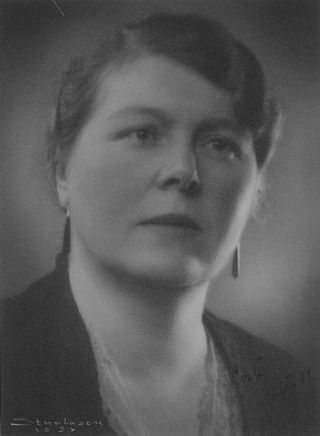
Constance Wiel Schram was a Norwegian writer and translator. She was the daughter of William Martin Nygaard (1865–1912) and Constance Wiel (1866–1931). Constance was the eldest of seven siblings, one of her brothers was the publisher, Mads Wiel Nygaard. She married Finn Thomas Andreas Schram on 26 Jul 1912, and they had a son, Andreas.
The National Association for Women's Suffrage was a Norwegian association for women suffrage, active from 1898 until 1913. It was founded by members of the Norwegian Association for Women's Rights (NKF), and the two organizations were closely related, at times sharing the same president.

Aadel Lampe was a Norwegian women's rights leader, liberal politician, teacher for deaf children and suffragist in the late 19th and early 20th century. She was elected as a deputy member of the Storting in 1922, as one of the first women elected to the Norwegian parliament, and served as president of the Norwegian Association for Women's Rights from 1922 to 1926.

The Norwegian National Women's Council was founded on 8 January 1904 as an umbrella organization for the various Norwegian women's associations. It was established by Gina Krog whose international contacts had revealed that the International Council of Women was keen to include a delegation from Norway. As a result of diminishing interest, the organization discontinued its work at the end of 1989.
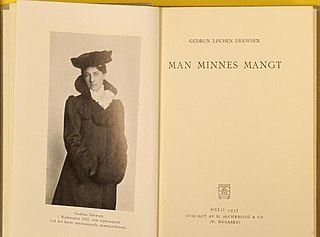
Gudrun Løchen Drewsen (1867–1946) was a Norwegian-born American women's rights activist and painter. A competent organizer and strategist, she was one of the founders and principal figures in New York's Norwegian Suffrage League. She contributed effectively to the American suffrage cause after Norwegian women were granted voting rights in 1913. As a painter, she participated in Oslo's national art exhibition in 1890.
Ole Olsen Malm was a Norwegian physician, veterinarian, civil servant and politician.
















